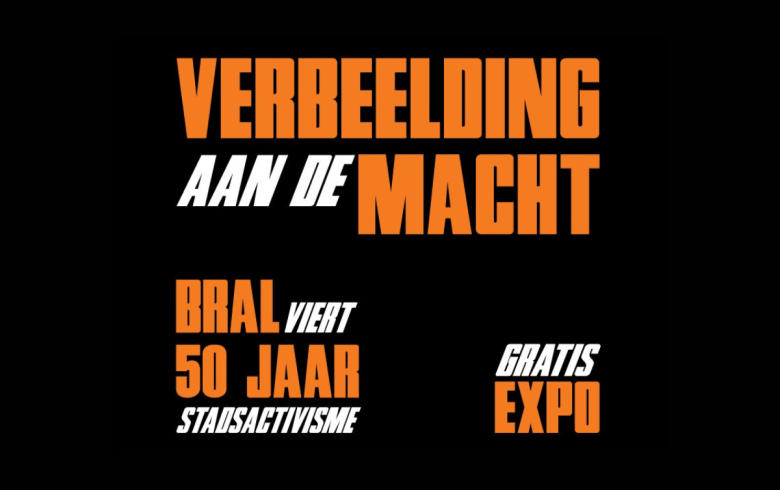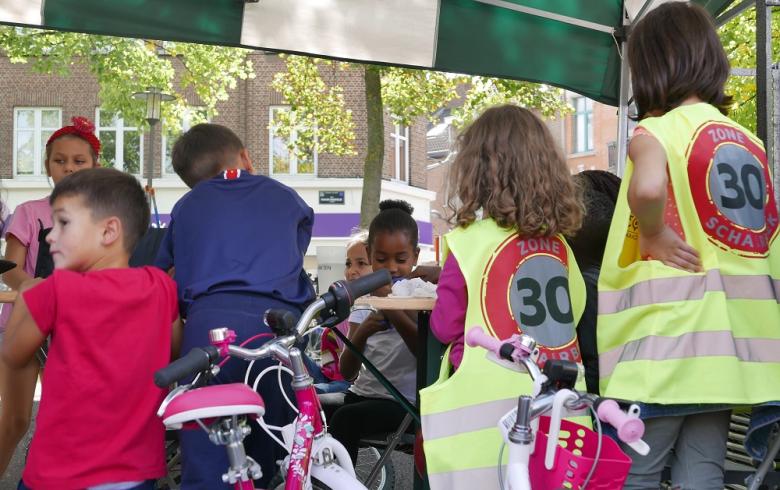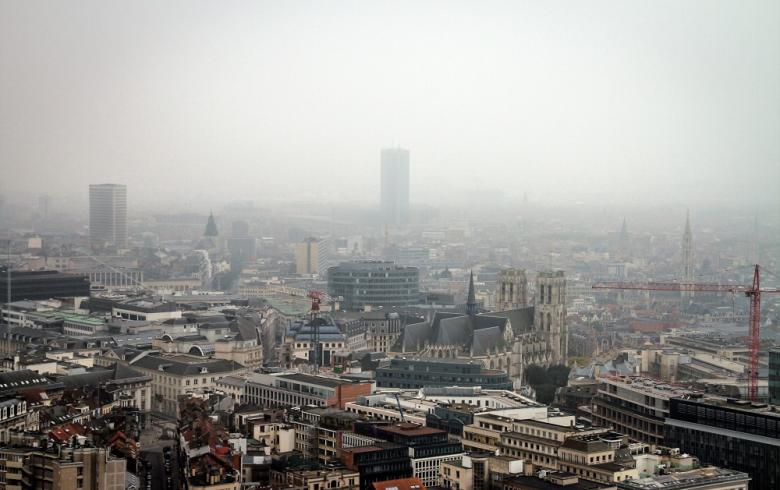
Hundred forty health and environmental experts ask for strong clean air measures in Brussels
At the occasion of World Health Day, the NGO Les chercheurs d’air launched an op-ed, supported by the Société Scientifique de Médecine Générale. Over a hundred professionals from health institutions and environmental organisations, among which BRAL signed the letter, which asks for strong measures to combat air pollution in the Brussels Region.
Initially published in Le Soir, De Morgen and The Guardian
Dear candidates for the 2024 Brussels municipal and regional elections,
We, doctors, scientists, health institutions and environmental organisations, ask you, if elected, to do everything in your power to fully combat air pollution in the Brussels-Capital Region.
The Belgian capital city is one of the most polluted in Europe. It is exposed to high levels of fine particles and nitrogen dioxide (two pollutants emitted at 30% and 60% respectively by road traffic); sometimes well above the recommendations of the World Health Organization (WHO). In some places, the level exceeds the WHO guideline by 5 times for nitrogen dioxide and 2 times for fine PM2.5 particles.
Every year, more than 900 Brussels residents die prematurely due to poor air quality. This represents more than 2 deaths per day and more than 10% of mortality in the capital, from all causes combined.
Fine particles can end up in our bloodstream, passing through our lungs, and penetrating our hearts or our brains. Here is a long and yet not exhaustive list of health impacts caused by this pollutant: increased risk of cardiovascular disease, stroke, premature birth, attention deficit disorder in children, risk of dementia in the elderly, certain types of diabetes, and even certain cancers.
Nitrogen dioxide, an irritant gas, can contribute to the development of asthma, as well as increase the risk of respiratory infections and chronic lung difficulties (coughing, difficulty breathing, reduced sense of smell, bronchitis, allergies, etc.).
Children are particularly vulnerable to air pollution because their metabolism is still developing, they breathe more quickly and, due to their small size, they are closer to sources of pollution such as exhaust pipes. Therefore, fighting against air pollution makes it possible to protect the health of young people better.
Air pollution generally hits disadvantaged communities harder. Indeed, their access to green spaces, sports activities or a healthy diet is often difficult, which does little to counterbalance the harmful impacts of pollutants on their health. In addition, they are often more exposed to indoor air pollution, which further exacerbates the effects of outdoor pollution.
Air pollution is also a financial drain. In 2018, it cost the Brussels region 1.6 billion euros in total, or €1,400 on average per Brussels resident for this year alone.
The European Union is in the process of reviewing air quality standards, so that they are stricter and closer to the WHO recommendations. However, this will take time to implement and the new limits will remain insufficient to protect the health of Brussels citizens properly.
We, doctors, scientists, health and environmental organisations, therefore ask you, candidates to the 2024 regional and municipal elections, to commit clearly and firmly to fighting air pollution at local level during your mandate if you were to be elected.
This fight must go through:
- Strict maintenance of the Low Emissions Zone (LEZ) timeframe, namely an exit from diesel engines by 2030 and thermal engines by 2035 at the latest throughout the territory of the Brussels Region. The LEZ is, to date, the most effective tool to combat air pollution in the city. It has enabled nitrogen dioxide reductions of almost 40% in certain places.
- The development of low traffic neighbourhoods, like the one that has been set up in the centre of Brussels. The reduction in road traffic (by 15 to 20% in one year in the Pentagon district) implies a reduction in air pollution, but also in noise and the risk of accidents. This also frees up public space, which can become greener more easily this way.
- The creation, wherever possible, of pedestrian and green streets in front of schools. Research from London and Paris proves (see here and there) that school streets make it possible to effectively combat air pollution. They protect children, who spend a large part of their time at school, better from pollution.
- A strong incentive to use collection points, rather than home delivery, for parcels, size and weight permitting. Deliveries, most often made by diesel vans, are a growing source of air pollution. However, 60% of Brussels residents live less than 5 minutes on foot and 98% less than 10 minutes from a relay point.
- The development of car sharing to reduce the number of vehicles in the city. In fact, a shared car replaces several private cars, which helps fight air pollution. This optimization of vehicles also makes it possible to free up parking spaces and, thus, create opportunities for greening and/or increasing the space dedicated to active mobility.
- Increasing the network of cycle paths separated from traffic on roads with heavy traffic. We recommend favouring, as soon as possible, the creation of infrastructures that are quick to implement and inexpensive, in order to ensure good security conditions in the short term (without waiting for the creation of large-scale projects).
We thank you in advance for your clear and strong commitment to the health of all Brussels residents.
Kind regards,
– Pierre Dornier, Directeur, Les chercheurs d’air
– Marelli Andrea, Infirmier
– Philippe Bastenier, Médecin généraliste
– Amandine Ben Abbou, Médecin
– Fleur Benghiat, Médecin
– Cyril Berthault-Jacquier, Acheteur Opérationnel, Cliniques de l’Europe
– Céline Bertrand, Infirmière pédiatrique, enseignante en santé publique et médecine environnementale, membre de la cellule environnement de la SSMG
– Jessica Beurton, Médecin
– Flora Billiouw, Sage-femme, Wheel of Care
– Jean-Claude Bollaerts, Médecin généraliste
– Catherine Bouland, Professeure de l’Université Libre de Bruxelles, Centre de recherche en santé environnementale et santé au travail
– Marie-Laure Boulangé, Médecin généraliste
– Xavier Brenez, Directeur général, Mutualités Libres
– Antoinette Brouyaux, Coordinatrice, Associations21
– Marie Bruyneel, Pneumologue
– Wies Callens, Porte-parole, Fietsersbond
– Julie Catala, Médecin généraliste à vélo
– Janet Catherine, Médecin
– Véronique Chalon, Employée, Ribaucare Espace Social Santé Intégré
– Cédric Chevalier, Essayiste
– Clarisse Chomat, Kinésithérapeute
– Sébastien Cleeren, Médecin généraliste, Cellule environnement SSMG
– Patrick Colart, Gynécologue
– Prof. Dr. Bruno Colmant, Membre de l’Académie Royale de Belgique
– Benoit Coppens, Médecin généraliste
– Gaetane Coppens, Chimiste, Enseignante
– Patricia Cornejo Lucaveche, Médecin généraliste
– Mathilde Costantini, Médecin généraliste
– Marie Coulon, Médecin
– Nina Covalski, Assistante sociale Maison Médicale
– Pauline Crespin, Médecin
– Amine Dahmane, Médecin
– Paul De Munck, Médecin généraliste
– Constance De Viron, Médecin
– Caroline De Voecht, Acheteuse junior et sustainability manager, Cliniques de l’Europe
– Aurélie Debande, Médecin
– Elisabeth Defourny, Médecin généraliste
– Isabelle Defrance, Pharmacienne
– Valérie Del Re, Directrice, Greenpeace Belgique
– Anne Delfosse, Médecin généraliste
– Guillaume Delhay, Médecin généraliste
– Juliette Demey, Kinésithérapeute
– Emilie Desbonnez, Médecin généraliste
– Anne Devedeleer, Médecin généraliste
– Florence Devuyst, Médecin généraliste
– Thomas Deweer, Chargé de politique, Fietsersbond
– Valérie Dinh, Médecin généraliste
– Hélène Dispas, Médecin généraliste
– Joachim Docquir, Pédiatre
– Aurélie Dory, Médecin généraliste
– Virginie Dufour, Médecin
– Thomas Duponcheel, Médecin généraliste
– Patrick Dupriez, Président, Etopia
– Romain Dury, Médecin généraliste
– Pauline Dutron, Coordinatrice, Les amis de la Terre
– Fatiha El Hajjami, Médecin généraliste
– Simon Elst, Infirmier, Etudiant en santé environnementale à l’École de Santé Publique, ULB
– Reza Esmaeilzadeh, Expert énergie et Développement Durable, Hôpitaux Iris Sud
– Jean-François Fauconnier, Ingénieur de l’environnement
– Benjamin Fauquert, Médecin généraliste, Enseignant ULB
– Javier Fernandez, Médecin généraliste
– Kim Fernandez, Chercheuse
– Jamie Lee Fossion, Coordinatrice maison médicale / ULB
– Véronique Godding, Pédiatre pneumologue, tabacologue
– Pierre Hallet, Médecin généraliste
– Fanny Hanssens, Médecin généraliste
– Aminatou Haouaou, Médecin généraliste
– Antigone Hatzfeld, Médecin généraliste
– Grégoire Hautain, Responsable du Contrôle de gestion, Chirec
– Jean-Philippe Hauzeur, Médecin Rhumatologue, professeur ULB
– Alexandre Heeren, Professeur UCLouvain & Chercheur Qualifié F.R.S.-FNRS
– David Hercot, Conseiller en santé publique
– Christophe Heylbroeck, Médecin-Directeur Adjoint Mutualités Libres/Onafhankelijke Ziekenfondsen
– Edouard Hosten, Médecin urgentiste
– Vincent Huberland, Médecin généraliste
– Dragos Ifrim, Médecin anesthésiste
– Chloé Joris, Pédiatre pneumo-allergologue
– Elise Kains, Médecin généraliste
– Paul Kelchtermans, Médecin généraliste
– Emilie La, Médecin généraliste
– Gaëtane Ladrier, Médecin généraliste
– Romain Lappeman, Médecin généraliste
– Miguel Lardennois, Infirmier, Conseiller en politique de santé
– Eléonore Lefebvre, Médecin généraliste
– Carole Lekeux, Médecin généraliste, membre de la cellule Santé et Environnement SSMG
– Guillaume Leleu, Médecin généraliste
– Roger Leonard, Médecin généraliste
– Laurence Lewalle, Directrice, GRACQ
– Lauranne Leysen, Médecin généraliste en formation
– Laurent Lievens, Enseignant-Chercheur
– Catherine Luyten, Médecin-Dermatologue
– Denis Mannaerts, Directeur, Cultures et Santé asbl
– Laetitia Marlier, Médecin
– Philippe Marneth, Médecin-Directeur, Mutualités Libres
– Quentin Mary, Médecin généraliste, Président de la SSMG
– Audrey Masset, Infirmière
– Guy Masson, Médecin généraliste
– Sandrine Mathieu, Médecin gériatre
– Jeffrey Matthijs, Directeur, Autodelen.net
– Sylvie Meekers, Directrice Générale, Canopea
– Larissa Mélot, Médecin généraliste
– Ann Morissens, Présidente du groupe de travail intermutualiste sur la santé environnementale
– Tim Nawrot, Professeur en épidémiologie environnementale
– Mathilde Noiset, Médecin généraliste
– Marie Nolet, Médecin
– Catherine Oblin, Médecin généraliste
– Alexia Orban, Médecin généraliste
– Patricia Palacios, Médecin généraliste, membre de la cellule environnement de la SSMG
– Jean Pauluis, Médecin responsable de la “cellule environnement” de la Société Scientifique de Médecine Générale
– Raf Pauly, Coordinateur, BRAL
– Martine Picard, Médecin généraliste
– Stéphanie Richard, Consultante et formatrice infirmière, Care-act-terre
– Caroline Rombeau, Psychologue
– Elisa Rombouts, Médecin
– Perrine Rondelet, Médecin généraliste
– Miguel Rosal Martins, Infirmier, conseiller en politiques de santé
– Maëlle Sallets, Médecin généraliste
– Pauline Scarnière, Médecin généraliste
– Christina Doris Schmidt-Wirth, Médecin
– Catherine Scott, Médecin généraliste
– Maelle Sens, Médecin généraliste
– Jean-Christophe Servotte, Responsable de la recherche, Hénallux
– Vinciane Sizaire, Directrice, FARES
– Nicolas Stocké, Chargé de projets, Partenamut
– Ugo Taddei, Directeur Transport, ClientEarth
– Sarah Tak, Coordinatrice Klimaatzaak – Affaire Climat
– Françoise Tennstedt, Médecin
– Chloé Thiry, Médecin
– Lauriane Tribel, Chargée de projets RSE, CHIREC
– Luc Van Gorp, Président de la Mutualité chrétienne
– Laurence Van Lierde, Médecin généraliste
– Eric Van Poelvoorde, Activiste climatique
– David Van Reybrouck, Écrivain et Ambassadeur de l’Affaire Climat
– Jean-Pascal van Ypersele, Pr ém. UCLouvain, ex-Vice-Président du GIEC
– Noemie Vanackere, Médecin généraliste
– Maureen Vandenbroucke, Pédiatre
– Cécile Vanheuverzwijn, Médecin généraliste
– Pascale Vanoldeneel, Médecin généraliste praticien hospitalier
– Céline Vanschepdael, Médecin généraliste
– Karin Verbist, Médecin généraliste
– Paul Vollemaere, Médecin généraliste
– Christophe Winkel, Directeur, Provélo
– Halil Yildiz, Médecin interniste, Professeur, Cliniques Universitaires St Luc


